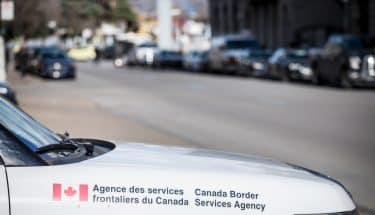Explosion of Irregular Entries by Asylum Seekers
For the last five years, the number of asylum seekers coming to Canada via so-called “irregular entries” has skyrocketed. Irregular entries refer to entries between official ports of entry such as through the forest or crossing a river. This increase in irregular entries has caused a major public outcry which I commented on in the interview below with Global News in 2017, and has even led the government to create a centralized repository of data and a quiz about myths surrounding asylum seekers (below).
It is important to note that “irregular” entries are not the same as “illegal” entries – if a person’s intention is to make a claim for asylum, they are permitted by international law to enter the country irregularly and may not be penalized for doing so; However, they must make their presence known to authorities immediately and go through the rigorous background checks, including being arrested, in order to avoid breaking any Canadian laws.
The first quarter of 2020 began with thousands of irregular entries intercepted by Canada Border Services Agency (CBSA), who is responsible for all enforcement of Canadian border and immigration laws. CBSA intercepted around 1000 people each month, and then in April 2020, irregular entries were ceased due to covid-19. In all subsequent months of 2020, 30 or fewer irregular entries were intercepted by CBSA each month leading to the lowest total number of irregular entries – 3266 – in years.
Contrast this number with the numbers in previous years:
|
Year |
Number of Irregular Entries |
|
2020 |
3,266 |
|
2019 |
16,503 |
|
2018 |
19,419 |
|
2017 (year of the interview above) |
20,593 |
|
2016 |
10,425 |
| 2015 |
6,620 |
Impact
This explosion in the numbers of irregular entries of asylum seekers has had multiple tangible impacts which have caused a humanitarian crisis in Canada:
- Quebec shelters became overwhelmed, leading the Premier to refuse a place for any new asylum seekers in Quebec and forcing them to be bussed to Ontario
- Subsequently, Toronto shelters became overwhelmed and forced to operate at near 100% capacity, leading to the asylum seekers being bussed to alternative locations in Canada with far fewer services set up to assist refugees (and farther from the Immigration and Refugee Board where their claim will eventually heard in person and decided)
- The previous government codified mandatory maximum processing times for refugee hearings of 45 days. The Immigration and Refugee Board determined in 2018 that it was physically unable to meet these legal requirements leading to a hiring blitz for Members of the Immigration and Refugee Board to decide cases
- The wait time for a refugee hearing skyrocketed from the legally mandated 45 days to well over 2 years
Safe Third Country Agreement
Apart from a misguided tweet from the Prime Minister in 2017 treating human beings as political pawns and pouring gasoline on the already burning fire of a refugee humanitarian crisis within Canada(below), the elephant in the room funneling people from the United States to a path at Roxham Road in Quebec in order to make a claim for refugee status is the Safe Third Country Agreement. This bilateral agreement between Canada and the United States established each other as a designated safe third country, and was intended to prevent refugee claimants from “shopping” for status in one country after they had already had the opportunity to make a claim for asylum in the other country.
However, either through genuine lack of foresight on both sides 20 years ago, or through extremely acute foresight on the part of US diplomats, the STC Agreement is only applicable at official Ports of Entry, such as land border crossings, airports, and seaports. If a person enters either Canada or the US “irregularly” at a place which is not an official border crossing, the Agreement does not apply. This loophole means that those who would otherwise be unable to make a claim for refugee status if they had gone to a regular Port of Entry, would now be able to do so if they crossed the border irregularly.
In July 2020, the Federal Court of Canada found the Safe Third Country Agreement to be unconstitutional, and ordered that the Agreement be dismantled. The government of Canada is appealing the decision and the Agreement will remain in place until the court decision is finalized.
Irregular Entries Today
When the US and Canada agreed to suspend the admission of irregular entries in March 2020 due to covid-19, Canadian officials said that they had been assured those who were not allowed to enter Canada would not be deported from the US. One man who was returned to the US after attempting to enter Canada has already been deported to his native Burundi, having exhausted all legal options in the US. Several others are being detained in the US with final orders of removal from the United States.
As a result, Canadian Minister of Immigration, Refugees, and Citizenship, Marco Mendocino, has granted exemptions to several individuals in similar situations, allowing them to enter Canada despite all border restrictions in place to slow the spread of covid-19 in Canada. If they are released by the US, they will be allowed to enter Canada. These same exemptions were granted to NHL players entering Canada from the US throughout the 2019-2020 hockey season. Both countries have stated that they are committed to the principle of “non-refoulement,” which means not sending someone back to a country where they will be persecuted.
COVID-19
Covid-19 has thrown the entire Canadian immigration system into chaos worldwide:
- Processing times have increased by over 8 months and possibly as much as a year for certain immigration applications – even IRCC does not know how long the backlog is
- Family Sponsorship applications were not even opened by IRCC between Mid February – Mid August 2020
- Many requirements under the law have been suspended such as the requirement for applicants to provide biometrics in certain circumstances
- Temporary residents in Canada are currently allowed to restore their status even if the 90 day restoration period has passed
Will the Safe Third Country Agreement ultimately be found to be unconstitutional? Would this decision be good for Canada and for asylum-seekers? How else will covid-19 impact Canadian immigration? These are all unknowns.
However, what is known even if it is not stated, is that the pandemic has allowed CBSA, the Immigration and Refugee Board, the shelter system, and all of the agencies responsible for processing inland refugee claims and impacted by irregular entries to catch their collective breath on at least one crisis.
Sources
https://www.canada.ca/en/immigration-refugees-citizenship/services/refugees/asylum-claims/
https://www.canada.ca/en/immigration-refugees-citizenship/campaigns/irregular-border-crossings-asylum.html
To those fleeing persecution, terror & war, Canadians will welcome you, regardless of your faith. Diversity is our strength #WelcomeToCanada
— Justin Trudeau (@JustinTrudeau) January 28, 2017
https://www.canada.ca/en/immigration-refugees-citizenship/corporate/mandate/policies-operational-instructions-agreements/agreements/safe-third-country-agreement.html
https://www.canada.ca/en/public-safety-canada/news/2020/08/government-of-canada-to-appeal-the-federal-court-decision-on-the-safe-third-country-agreement.html
https://www.canada.ca/en/immigration-refugees-citizenship/corporate/publications-manuals/operational-bulletins-manuals/refugee-protection/canada/processing-claims-refugee-protection-post-interview-final-decision.html
https://www.cbc.ca/news/canada/montreal/quebec-asylum-seekers-1.4650829
https://www.theglobeandmail.com/politics/article-asylum-seeker-surge-at-quebec-border-choking-canadas-refugee-system/



